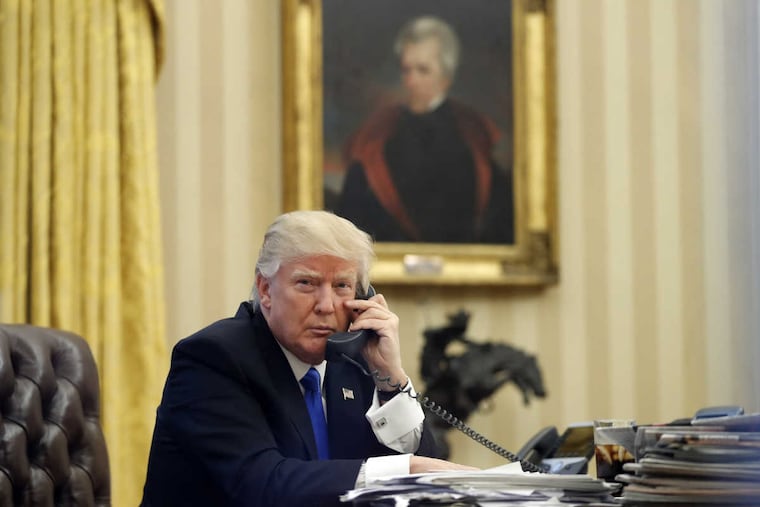The U.S. survived Jackson, and will probably survive Trump, too
Donald Trump's legacy of honors is already proving far less enduring than his presidential hero and fellow disruptor, Andrew Jackson.

After thousands of supporters of President Donald Trump assaulted the U.S. Capitol last week, vandalizing, threatening, fighting, some carrying rebel flags, Americans recoiled at an ugly scene we were told was unprecedented.
The ugly scene did recall another rowdy Washington gathering long ago, not so dark in hindsight, but a defining moment that threw a scare into the national elite under an earlier, loud, pugnacious president.
In March 1829, shortly after war hero Andrew Jackson was made the first president to take office winning the popular vote of the (white male) American people, “Old Hickory” invited 20,000 happy Democrats into the White House.
They stomped mud into the carpets, broke dishes, ripped curtains, and generally disrespected the place until they were lured back out by vats of whiskey punch and horse races on the lawn. The scene in the president’s house seemed to confirm establishment warnings that the United States had elected a power-hungry, unprincipled populist who would let the dangerous masses wreck the republic. (The republic survived; it grew.)
Early in Trump’s term, he cited Jackson as a model and hero, traveling to Tennessee to lay a wreath at Jackson’s home and hanging Jackson’s picture in the Oval Office. He defended Jackson’s Washington statue when Black Lives Matter protesters demanded its removal.
Historians generally agree now that Jackson represents a dark side of the American story. An enslaver and Indian fighter, he seized Florida and forced Southern tribes onto the infamous Trail of Tears. But his place in the national pantheon endures: Jackson remains on your $20 bill.
Trump’s detractors don’t like to admit that he embraced many genuinely popular policies — cheap money (he demanded the Federal Reserve drive interest rates ever lower), spending way more than he collected in taxes (leaving record deficits), no new foreign wars (but lots of job-rich military contracts), taxes on imports.
All this goes against what Republicans used to stand for. Trump was also anti-immigration, at odds with Republican employers who have welcomed cheap labor and energy from abroad. He picked fights with such top capitalists as Amazon’s Jeff Bezos. He suggested that Comcast, Facebook, and Google should be broken up (also a popular position).
To be sure, Trump had plenty of Big Business supporters, many of whom turned on him only after Wednesday’s attack on the Capitol. Which of their contributions were proof of loyalty, and which were just paying protection?
Add it up, and we can imagine a braver, more enterprising, and less selfish populist than Trump seeking common cause with such lefties as Bernie Sanders and Alexandria Ocasio-Cortez, trying to appeal to that large mass of Americans who believe that both parties are relentlessly ripping us off.
Instead, taking a page from his long training in crowd entertainment with friends Linda and Vince McMahon of professional wrestling fame, Trump slagged Democrats relentlessly, and bet he could lead without them.
And Republicans, at least until Wednesday, backed him overwhelmingly. What else could “Never Trumpers” do, besides quit? He had thrashed their most popular governors and senators in the 2016 primaries and forced GOP critics out of Congress.
The GOP, like all parties of wealth, needs populists. It’s a problem as old as the republics of ancient Greece and Rome: The people outnumber the rich; they need faces and programs that win popular votes.
The Republicans I hear from were willing to back Trump despite his bad manners and populist policies, so long as he delivered on their most important goals: business, wealth, and income tax cuts, and all those new conservative (pro-business, maybe even anti-abortion) federal judges.
Mission accomplished. But then in November, Trump lost in Pennsylvania, even as the GOP won statewide offices and extended its state House control.
With Wednesday’s insurrection — and, this time, tragedy followed farce — Trump left his followers shamed and defeated, and some facing federal charges. To many Republicans and to Big Business, he has become a liability, not an asset, though they know not who their next champion will be.
Jackson’s reputation has been fading as historians work the stories of Black and brown people back into the national narratives. President Barack Obama tried to replace Jackson on the $20 bill with Harriet Tubman, a Union scout and liberator of enslaved people. Trump canceled that, but Joe Biden will be in a position to finish his old boss’ move.
Trump’s legacy is already far less enduring than his hero’s. After the Capitol attack, Lehigh University trustees took away his honorary degree (he still has his real one from Penn). What public institution, what custodians of a national honor, still want to be associated with Donald J. Trump?